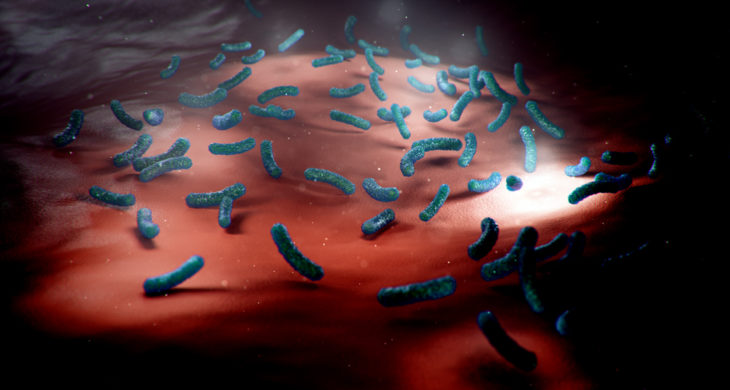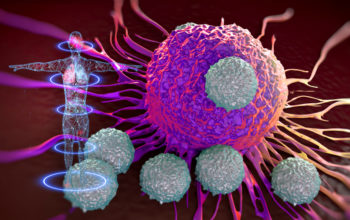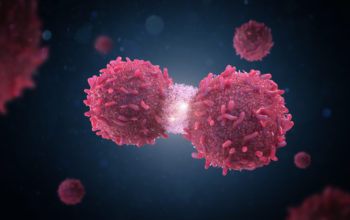
Date: 9th February 2021
Anti–programmed cell death protein 1 (PD-1) immunotherapy provides long-term clinical benefits for cancers such as melanoma and lung cancer. Microbial communities that live on and in the human body can impact health and impact cancer progression and response to therapy. The composition of the gut microbiota correlates with anti-PD-1 efficacy in preclinical models and in cancer patients. Now, two studies provide evidence that transplanted faecal microbiota can overcome resistance in PD-1–refractory metastatic melanoma patients.
Anti–PD-1 immunotherapy leverages immune checkpoint blockade with monoclonal antibodies (mAbs) targeting PD-1 and is used in nearly 40% of patients with advanced melanoma. However, some patients do not respond to PD-1 blockade, whilst others become resistant to treatment allowing the progression of tumours.
One promising area of research to overcome anti-PD-1 immunotherapy resistance involves the modulation of the gut microbiota. Studies in mice have shown that faecal microbiota transplantation (FMT) – which transfers the entire gut microbiota from one host to another- promotes anti–PD-1 efficacy in melanoma-bearing mice. There are also several lines of evidence to suggest that favourable gut microbiome corresponds with a positive response to anti-PD therapy in cancer patients. However, the precise composition and mechanism of how these microbiota enhance immunotherapy is not yet fully understood, and whether changing the gut microbiota in humans can overcome resistance has yet to be evaluated.
Now, scientists in two studies published in Science journal report the first-in-human clinical trials to test the safety and feasibility of whether FMT can enhance metastatic melanoma patients response to anti–PD-1 immunotherapy.
Study by Davar et al.
One team of researchers from the National Cancer Institute, part of the National Institutes of Health, and UPMC Hillman Cancer Center at the University of Pittsburgh, US, led by Hassane Zarou and Giorgio Trinchieri, enrolled 16 melanoma patients in their clinical trial, all of which were primary refractory to anti–PD-1 therapy. The FMTs were harvested from 7 melanoma patient donors who were long-term, anti–PD-1 therapy responders (R), including four with complete response (CR) and three with partial response (PR). A single FMT was administered along with anti-PD-1 therapy which was repeated every 3 weeks.
The team found that this combination treatment was well tolerated, and provided clinical benefit to 6 out of 15 patients (one was excluded from the complete study). It induced durable perturbation of the recipient’s gut microbiome and reprogrammed the tumour microenvironment to overcome resistance to anti–PD-1 in this subset of resistant melanoma patients.
Study by Baruch et al.
The second study was performed by researchers from Tel Aviv University and Sheba Medical Cente, Israel, and the University of Pennsylvania and the University of Texas MD Anderson Cancer Center, US, led by Ben Boursi and Gal Markel. In this clinical trial the team enrolled 10 participants with confirmed progression on anti–PD-1 therapy and 2 FMT donors who had previously been treated with anti–PD-1 monotherapy for metastatic melanoma and had achieved a CR for at least 1 year.
In contrast, to the previous study the recipients of FMT first underwent an initial native microbiota depletion phase using antibiotics. Then the FMT was performed, anti-PD-1 therapy was administered along with additional oral stool capsules (maintenance FMT) given every 14 days until day 90.
The team found FMT to be safe, feasible and potentially effective. They saw a clinical response in 3 patients, 2 partial and one complete response, although all 3 responders were attributed to one of the donors. The treatment was associated with a favourable changes in immune cell infiltrates and in gene expression profiles in the tumour microenvironment and the gut lamina proporia.
Conclusions and future applications
The teams here have both presented early data that suggest FMT can modulate the gut microbiota, and together with anti-PD-1 immunotherapy, can overcome resistance in a subset of melanoma patients. The combined treatment was able to enhance the immune response and reprogrammed the tumour microenvironment and the surrounding tissue.
Both teams plan to extend their trials, as the initial results warrant further investigation in larger cohorts. The Zarou group hope by increasing the participants and donors they will be able to identify microbial and human biomarkers that can be used to select the most likely patient responders to FMT treatment. Their ultimate aim is to identify bacterial consortium capable of transforming refractory patients to responders. It may then be possible to treat patients with these organisms directly, without the need for faecal transplant which would be highly desirable and beneficial.
The association between the microbiome and medicine is a rapidly evolving field. The work here provides an insight into the power that harnessing and manipulating microbiota has to offer in the development of new therapies and treatments. We have recently seen digital platforms being employed to search for new molecules such as antibiotics in the genome of human microbiota. Digital tools such as artificial intelligence and machine learning may offer a distinct advantage in finding suitable biomarkers, or optimal bacterial consortia for the use here and in a wide range of diseases.
As such, the role of the microbiome in the progression and development of disease is starting to be unravelled, and has been associated with obesity, hypertension, cardiovascular disease, diabetes, depression and arthritis to name but a few. Furthermore, with at least 700,000 people dying each year due to drug-resistant diseases the use of microbiota as a crucial element in the fight against antimicrobial and antibiotic resistance is already underway.
For more information please see the press release from NIH
Davar, D., A. K. Dzutsev, J. A. McCulloch, R. R. Rodrigues, J.-M. Chauvin, R. M. Morrison, R. N. Deblasio, C. Menna, Q. Ding, O. Pagliano, B. Zidi, S. Zhang, J. H. Badger, M. Vetizou, A. M. Cole, M. R. Fernandes, S. Prescott, R. G. F. Costa, A. K. Balaji, A. Morgun, I. Vujkovic-Cvijin, H. Wang, A. A. Borhani, M. B. Schwartz, H. M. Dubner, S. J. Ernst, A. Rose, Y. G. Najjar, Y. Belkaid, J. M. Kirkwood, G. Trinchieri and H. M. Zarour (2021). “Fecal microbiota transplant overcomes resistance to anti–PD-1 therapy in melanoma patients.” Science 371(6529): 595-602.
https://doi.org/10.1126/science.abf3363
Baruch, E. N., I. Youngster, G. Ben-Betzalel, R. Ortenberg, A. Lahat, L. Katz, K. Adler, D. Dick-Necula, S. Raskin, N. Bloch, D. Rotin, L. Anafi, C. Avivi, J. Melnichenko, Y. Steinberg-Silman, R. Mamtani, H. Harati, N. Asher, R. Shapira-Frommer, T. Brosh-Nissimov, Y. Eshet, S. Ben-Simon, O. Ziv, M. A. W. Khan, M. Amit, N. J. Ajami, I. Barshack, J. Schachter, J. A. Wargo, O. Koren, G. Markel and B. Boursi (2021). “Fecal microbiota transplant promotes response in immunotherapy-refractory melanoma patients.” Science 371(6529): 602-609.
https://doi.org/10.1126/science.abb5920


